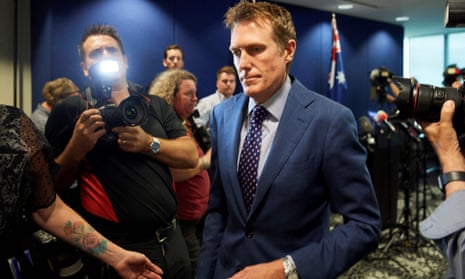With the Australian government already scrambling to deal with the fallout over its handling of an allegation of sexual assault against a minister’s staffer – alleged to have occurred just metres from the prime minister’s office in 2019 – a rape allegation levelled against the attorney general has sent it sprawling.
Christian Porter has emphatically denied all allegations he raped a fellow competitor when the then teenaged pair attended a debating competition in Sydney in 1988. The alleged victim died in 2020.
The woman, who remains unnamed to protect her legacy and her family, had gone to police indicating she wanted to proceed with a historical complaint in early 2020, but the pandemic, and her mental health, delayed a police interview. She withdrew the complaint in June that year, telling police she did not believe she could continue for medical and personal reasons.
She died the following day. Without a formal interview, and with the complaint officially withdrawn, the investigation was closed with the woman’s death.
Last month, an anonymous dossier detailing the woman’s complaint was sent to at least four members of parliament, including the prime minister. It was sent to police, and news of the rape allegation against a current government cabinet minister went public.
The prime minister, Scott Morrison, assumed a passive position, admitting he had not read the documents containing the allegations that had been sent to his office, but said he had spoken to the then unnamed minister who had “vigorously” denied the document’s contents.
Morrison said he had heard “rumours” earlier in the year that one of his ministers had been accused of rape but had not pursued them, or sought to discover which minister the allegations pertained to. He deflected questions on action he, as prime minister, might take to investigate the allegations, claiming it was a matter for the police, who had already closed their inquiries in light of the complainant’s death.
On Wednesday, the attorney general identified himself as the accused cabinet minister during a 42-minute press conference in which he denied all allegations. Porter said that to stand aside from the ministry over an untrue allegation would amount to the rule of law crumbling in Australia. He said he would take two weeks’ medical leave to deal with mental health issues.
Morrison and his government backed Porter’s position, claiming any independent inquiry into the matter, even to determine if Porter met ministerial standards, would be setting an unwelcome precedent. The prime minister said the attorney general had his full confidence in returning to his role.
Protests on the horizon
Australians have been split by the conversation dominating the nation’s most powerful institutions. The #MeToo movement did not gain the same traction in Australia as it did in much of the western world. High-profile men accused during the height of the movement have since won defamation actions. For the most part, cultural change across a range of social justice issues has been slow, the pace set by the so-called “quiet Australians” the prime minister identified as key to his government’s election. It is those Australians Morrison has been watching as he maps out his re-election.
Government MPs have been quick to report comments from constituents indicating their discomfort with the issue, and their shock at the “rudeness” of journalists’ questioning.
But on the flip side is a growing anger over the handling and dismissal of the issues. Women, and it has been predominately women, have gathered in private chat groups and online forums to discuss their shock and disbelief at the response from senior government leaders.
A plan for marches is gathering steam for when parliament returns in Canberra later this week. Women, many of whom are entering the world of activism for the first time, and their allies have stated their intentions to travel to the capital to have their voices heard.
Those feeling despair at the reaction of political leaders were emboldened and inspired by the words of the 26-year-old Australian of the year, Grace Tame, a tireless advocate for sexual assault survivors who, after bringing her own abuser to justice and working to change laws and attitudes, publicly and succinctly rebuked the prime minister for his reaction so far.
Asked if Morrison had been living up to his 2019 comments that rape victims should feel confident they would be heard, Tame said “clearly not”.
Those two words, on the back of a powerful speech calling for a change in attitude and response to sexual assault claims, came just hours before the attorney general held a press conference that has been identified as a watershed moment in Australian political history.
The government ended the week by announcing the sex discrimination commissioner would head an independent review into parliamentary culture. That announcement came at the same time the defence minister, Linda Reynolds, was being pushed into an apology for calling her former staffer Brittany Higgins a “lying cow”, a comment overheard by current staff in her office on the day Higgins went public with her rape allegations. Both Reynolds and the prime minister say the comment was not in relation to Higgins’ allegations, but subsequent reports of a lack of support. Morrison has excused the comments as having been made in private, in the heat of the moment.
For many people, women in particular, it is that behind-closed-doors attitude that is the problem.
